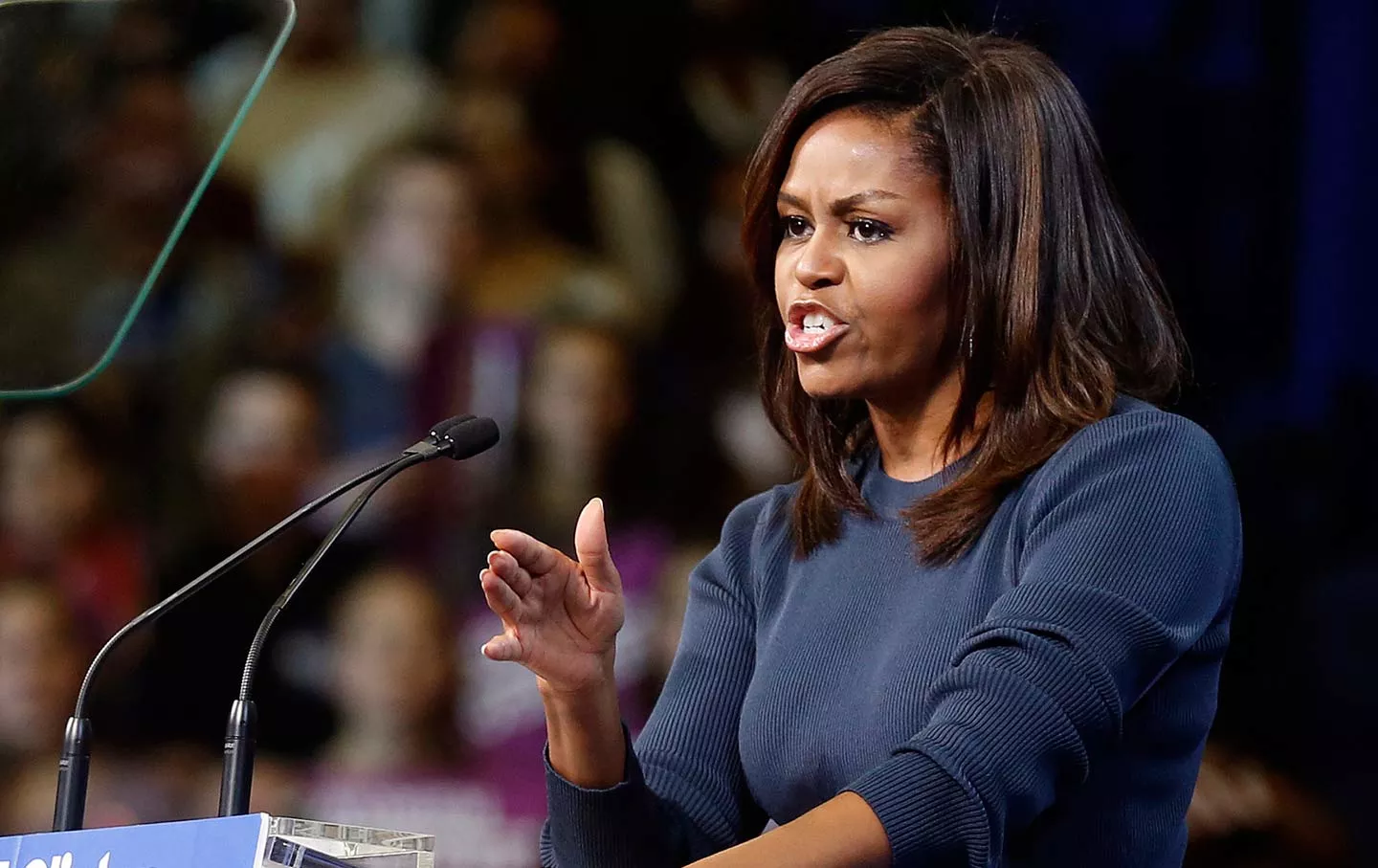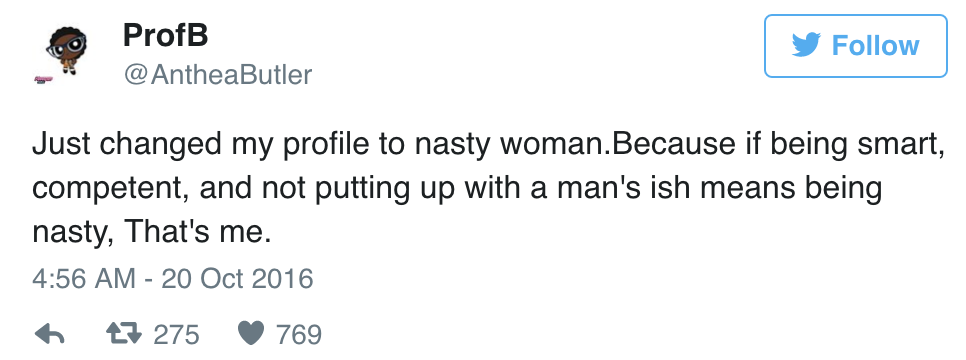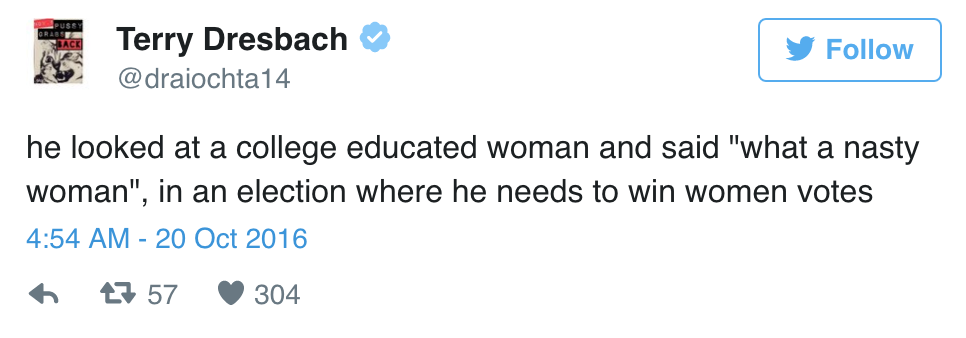Nasty is the New Nice: Women Reclaim Insult as Rally Cry

Last week, my former roommate shared on Facebook her story of being sexually assaulted at the age of 19 by an older man. She described how hearing Donald Trump's lewd and sexually aggressive comments in the leaked Access Hollywood tape not only took her back to that moment, but how the flippant and casual reaction of many took her back to an even lonelier one. "The fear that people would not take me seriously or that they would think what happened to me was my fault physically stopped me from speaking. I retreated. I am still in retreat," she writes.
She went on to say that it was the voice of Michelle Obama that brought healing to her in the wake of the tape's surfacing. At a campaign rally for Hillary Clinton in New Hampshire this week, the First Lady denounced Trump's words on women, imploring voters to stand up and say enough is enough. "This is disgraceful, it is intolerable, and it doesn't matter what party you belong to," she said. "No woman deserves to be treated this way. None of us deserves this kind of abuse."
First Lady Michelle Obama at a campaign rally for Hillary Clinton, Oct. 13, 2016. Image Credit: AP Photo/Jim Cole
Trump's trail of sexist comments over the years include, but are not limited to: humiliating a former Miss Universe for gaining weight, calling her "Miss Piggy" (2016), accusing Hillary Clinton of being an enabler of her husband's affairs (2016), bashing Carly Fiorina, saying "no one would vote for that face" (2015) stating Heidi Klum was "no longer a 10" (2015), attributing Megyn Kelly's interrogation to "blood coming out of her wherever" (2015), calling Arianna Huffington "unattractive" (2012), calling Cher "lonely" and a "loser" (2012), calling breastfeeding "disgusting" (2011), calling Anne Hathaway a golddigger (2008), calling Rosie O'Donnell "disgusting" and "a slob" (2006), saying he'd be dating Ivanka if she weren't his daughter (2006), and calling women "beautiful pieces of ass" (1991).
The one I can't shake off is Trump's reference to Lindsay Lohan on the Howard Stern show in 2004: "She's probably deeply troubled and therefore great in bed. How come the deeply troubled women, you know, deeply, deeply troubled, they're always the best in bed?"
Yet in response to a question about the Access Hollywood tape, he stated, "No one has more respect for women than I do." It recalls a similar statement: "No one understands the system better than me, which is why I alone can fix it."
How have we gotten here? How is this happening in a society renowned for championing women's rights? How have demagogues and self-proclaimed saviors gained such ground in what many consider the greatest country on earth?
Trump's past and present remarks on women bring to mind the numerous times I've been objectified, had sexist comments thrown my way, or experienced gender discrimination in various shapes and forms. I'm sure many other women feel the same way. Rape and sexual assault survivors like my roommate have come out on social media with tales of how Trump's comments triggered painful memories. Mental health facilities across the U.S. are organizing support groups for women experiencing trauma from the current political atmosphere. This election is literally making women sick.
The prospect of Donald Trump becoming president of the United States is not only horrifying, but unthinkable. It produces cognitive dissonance at a magnitude I seldom experience. Trump's bragging about sexually assaulting women cannot be written off as "locker room banter." It is repugnant to assume that's just the way men are, speak, or behave.
"I can't stop thinking about this," says Michelle Obama. "It has shaken me to my core in ways I couldn't have predicted... it would be dishonest and disingenuous of me to move on to the next thing like this was all just a bad dream. This is not something that we can ignore."
In the final presidential debate last week, Trump muttered "such a nasty woman" as Hillary Clinton explained her views on social security. What was meant as an insult, however, has taken an unexpected turn of events. It struck a chord with women across the nation, who reclaimed the phrase as a rallying cry. Social media lit up with hashtags like #nastywoman, #imanastywoman, and #nastywomenvote. Spotify streams of Janet Jackson's "Nasty" rose 250 percent in the last week. Sales in "Nasty Woman" merchandise such as t-shirts, tote bags, pillows, and coffee mugs have skyrocketed.
Image Credit: Society 6/Etsy
"Nasty" now has taken on a whole new meaning as women are embracing the term to celebrate feminine intelligence, power and ambition. If Hillary Clinton is nasty, they want to be nasty too.
You're a nasty woman if you happen to challenge the status quo, voice your opinion, get things done, and make a difference. You're a nasty woman if you speak out against sexism in the workplace. You're a nasty woman if you stand up for women's rights. You're a nasty woman if you ever dared to do something outside the conventional boundaries of your gender role.
"Donald thinks belittling women makes him bigger," Clinton said during the presidential debate. She continues, "He goes after their dignity, their self-worth, and I don't think there is a woman anywhere who doesn't know what that feels like. So we now know what Donald is and what he said and how he acts toward women. That's who he is."
Trump's "nasty woman" comment struck a chord with women because it encapsulates the way many of us have been treated throughout our lives. No matter how many times he tries to justify his remarks, or claims that no one respects women more than he does, he always gives us evidence of the contrary. All this brings to mind the classic story of the controlling husband who claims no one loves his wife more than him, apologizing for his behavior while continuing to be abusive.
America exposed these types decades ago, spreading awareness that this type of behavior was no longer acceptable, that women should never tolerate any form of abuse or shaming. Trump exposes his true character with each leaked tape and derogatory statement. In a beautiful turn of events, women are coming forward to reclaim their voice in this conversation with their own tales of abuse.
As evidenced by the recent #notokay campaign, sexism and abuse are still alive and well in the United States. It is too simplistic to assume that Hillary Clinton becoming the first female president will wipe out misogynistic behavior in the country any more than Barack Obama's presidency eased racial tensions in the past eight years.
Yet Trump calling Hillary Clinton a "nasty woman" may very well be the fire to fuel her campaign. Scores of women have adopted the slogan as their battle cry. Women previously lukewarm toward Clinton can now relate to her as the target of a sexist attack. It is likely that they'll get their revenge at the voting polls.
How nasty.











